 |
Welcome to the February 2012 issue of the Social Sciences
eNews
 Find us on Facebook
Find us on Facebook
Upcoming Events
Multi-Alternative Context Effects: Examining Changes in Choice Preferences
February 1, 2012
Ambiguity and Climate Policy
February 1, 2012
Blackout Glow Dance
February 1, 2012
UC Student Regent Luncheon
February 2, 2012
Armenia-Azerbaijan-Turkey: A Triangle of Mistrust
February 2, 2012
Race-Neutral Public Policies: Why the Policies Failed in San Diego and New York City and Succeeded in Los Angeles
February 3, 2012
Development of Deliberate Democratic Institutions in China
February 3, 2012
Temporal Causal Learning
February 6, 2012
Do We Need Speed Limits on Freeways?
February 6, 2012
Farther on Down the Road: Transport Costs, Trade and Urban Growth in Sub-Saharan Africa
February 8, 2012
Incarcerating Parenthood? The Countervailing Consequences of Paternal Incarceration
February 14, 2012
The Transitional Costs of Sectoral Reallocation: Evidence From the Clean Air Act and the Workforce
February 15, 2012
Conversations with Etienne Baliba
February 16, 2012
Digital Futures: What Comes After the Network Society?
February 16, 2012
Searching for Work with a Criminal Record
February 17, 2012
Rethinking Political Identity and Citizenship in Contemporary Africa
February 17, 2012
On Topological Objects in Field Theory
February 17, 2012
The Behavioral Response to Voluntary Provision of an Environmental Public Good: Evidence from Residential Electricity Demand
February 17, 2012
Neural Correlates of Auditory Cognition: Features, Categories and Decisions
February 22, 2012
Reflections on Washington Past, Present, and Future with Dennis Hastert, Former Speaker of the House
February 23, 2012
Following Suit, Setting the Terms, or Out of Touch?: Census Racial Categories and U.S. Media Discourse, 1850-1970
February 24, 2012
Does the Tax-Price Really Matter? An Analysis of Parcel Tax Elections for California
February 28, 2012
MPP Inaugural Class Welcome
February 29, 2012
|
Social Sciences
in the Media
Pass it on
Know anyone who might be interested in our newsletter? Email us to subscribe.
|
 |
 |
Capitalizing on culture
New book by sociologist Nina Bandelj examines how countries like South Africa exploit unique characteristics and culture for capital gain
 The roots of the South African Cape vineyards date back to the 1600s. A main stop along the international spice shipping route, the region's climate and varying soil types
proved to be excellent growing conditions for what was then a widely used remedy for scurvy: wine. Despite its rich heritage, it wasn't until the late 1990s that the country's
vintage came to be recognized internationally alongside more established favorites. The now highly regarded and sought after South African brands have industry-wide production
advancements to thank, in part, for their entry into the global market place, but also - and perhaps more importantly, says UCI sociologist Nina Bandelj - the symbolic value
behind the labels. In her new book, The Cultural Wealth of Nations, Bandelj and co-editor Frederick Wherry, University of Michigan, analyze how country-specific symbolism and
reputation - or cultural wealth - are often exploited for economic development purposes. Below, Bandelj explains how the national branding of unique geographical characteristics
and cultural customs - from the blossoming wine industry of South Africa to the rolling, tourist-filled hills of Tuscany - have helped economies around the world prosper, and
what this can teach us about culture's role in the contemporary economy.
The roots of the South African Cape vineyards date back to the 1600s. A main stop along the international spice shipping route, the region's climate and varying soil types
proved to be excellent growing conditions for what was then a widely used remedy for scurvy: wine. Despite its rich heritage, it wasn't until the late 1990s that the country's
vintage came to be recognized internationally alongside more established favorites. The now highly regarded and sought after South African brands have industry-wide production
advancements to thank, in part, for their entry into the global market place, but also - and perhaps more importantly, says UCI sociologist Nina Bandelj - the symbolic value
behind the labels. In her new book, The Cultural Wealth of Nations, Bandelj and co-editor Frederick Wherry, University of Michigan, analyze how country-specific symbolism and
reputation - or cultural wealth - are often exploited for economic development purposes. Below, Bandelj explains how the national branding of unique geographical characteristics
and cultural customs - from the blossoming wine industry of South Africa to the rolling, tourist-filled hills of Tuscany - have helped economies around the world prosper, and
what this can teach us about culture's role in the contemporary economy.
Read on...
Ethical choices during desperate times
Op-ed by Kristen Monroe, political science professor and UCI Interdisciplinary Center for the Scientific Study of Ethics & Morality director, highlights her latest book,
Ethics in an Age of Terror and Genocide: Identity and Moral Choice
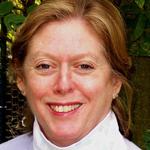 We all have memories of events so important that we can identify exactly where we were when they happened, who was with us, what we wore, or where we sat. I remember the day my
father told me about the Holocaust. We were in the car - a blue Chevrolet with plastic seat covers that cracked in the cold - driving to my weekly piano lesson. I can't recount
exactly what he said, but my memory remains fresh with a sense of horror so overwhelming I could hardly breathe. And then he told me: "You must always remember that there are no
depths to which man cannot sink, but there also are no heights to which we cannot soar." I have often thought about that over the past 20 years, as I have conducted research on
the Holocaust, trying to discover what made people respond so differently to the suffering of others. I realized the themes that emerged during the Holocaust resonate with other
periods of genocide and other instances of ethnic cleansing, other acts of prejudice and discrimination, of group hatred, and animosity, just as they resonate with other
instances of compassion, heroic altruism, and moral courage.
We all have memories of events so important that we can identify exactly where we were when they happened, who was with us, what we wore, or where we sat. I remember the day my
father told me about the Holocaust. We were in the car - a blue Chevrolet with plastic seat covers that cracked in the cold - driving to my weekly piano lesson. I can't recount
exactly what he said, but my memory remains fresh with a sense of horror so overwhelming I could hardly breathe. And then he told me: "You must always remember that there are no
depths to which man cannot sink, but there also are no heights to which we cannot soar." I have often thought about that over the past 20 years, as I have conducted research on
the Holocaust, trying to discover what made people respond so differently to the suffering of others. I realized the themes that emerged during the Holocaust resonate with other
periods of genocide and other instances of ethnic cleansing, other acts of prejudice and discrimination, of group hatred, and animosity, just as they resonate with other
instances of compassion, heroic altruism, and moral courage.
Read on...
'Eater bros
UCI alumni Rameen (political science) and Shauhin (criminology, law and society) Talesh returned to campus to pursue careers and give back to their alma mater
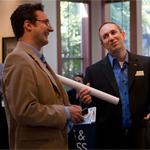 They call it the "Book of Records" - a well-worn folder filled with old papers that Rameen and Shauhin Talesh have had since childhood. Every time the brothers played
basketball, football, foosball, backgammon, Scrabble or any other game, they would duly note the winner. "We'd write down all of our matches," Rameen says. "I had the advantage
of being older, so I'd usually start out beating him, but there'd always come a time when he'd take over." The Talesh brothers (they have no other siblings) still engage in
friendly sibling rivalry - notably during intramural basketball games at UC Irvine's Anteater Recreation Center - but they no longer keep records of their wins and losses.
They've evened the score. Both graduated from UCI, went on to earn advanced degrees and launch careers, then returned to campus to work for their alma mater - Rameen as
assistant vice chancellor for student affairs and dean of students, and Shauhin as assistant professor of law and criminology, law & society.
They call it the "Book of Records" - a well-worn folder filled with old papers that Rameen and Shauhin Talesh have had since childhood. Every time the brothers played
basketball, football, foosball, backgammon, Scrabble or any other game, they would duly note the winner. "We'd write down all of our matches," Rameen says. "I had the advantage
of being older, so I'd usually start out beating him, but there'd always come a time when he'd take over." The Talesh brothers (they have no other siblings) still engage in
friendly sibling rivalry - notably during intramural basketball games at UC Irvine's Anteater Recreation Center - but they no longer keep records of their wins and losses.
They've evened the score. Both graduated from UCI, went on to earn advanced degrees and launch careers, then returned to campus to work for their alma mater - Rameen as
assistant vice chancellor for student affairs and dean of students, and Shauhin as assistant professor of law and criminology, law & society.
Read on...
Miss out on the inaugural Dean's Distinguished Lecture? Check out video online
Mohamed El-Erian, CEO and co-CIO of the Pacific Investment Management Co. (PIMCO), on the economy
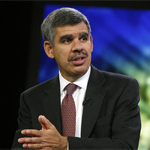 On January 25, Mohamed El-Erian launched the inaugural lecture of the School of Social Sciences Dean's Distinguished Lecture Series. The CEO and co-CIO of Pacific Investment
Management Co. (PIMCO), a Newport Beach-based investment firm which manages the world's largest bond fund, El-Erian is a frequent commentator on the post-2008 financial crisis,
the sovereign debt and Eurozone crisis, and political upheavals in the Middle East. His lecture offered insight on the roles that politics, policies and markets must play in
turning around the global economy.
On January 25, Mohamed El-Erian launched the inaugural lecture of the School of Social Sciences Dean's Distinguished Lecture Series. The CEO and co-CIO of Pacific Investment
Management Co. (PIMCO), a Newport Beach-based investment firm which manages the world's largest bond fund, El-Erian is a frequent commentator on the post-2008 financial crisis,
the sovereign debt and Eurozone crisis, and political upheavals in the Middle East. His lecture offered insight on the roles that politics, policies and markets must play in
turning around the global economy.
Check out video online...
Sprouse receives best paper award for study on magnitude estimation
Linguistic Society of America recognizes the cognitive scientist at annual meeting
 Jon Sprouse, cognitive sciences assistant professor, has received the Linguistic Society of America's 2011 Best Paper in Language award for "A Test of the Cognitive Assumptions
of Magnitude Estimation: Commutativity Does Not Hold for Acceptability Judgments." The honor recognizes the best paper(s) published in the society's premiere journal, Language,
in any given year. Sprouse's study appeared in the June issue of the quarterly publication and was one of two recognized with the award at the society's annual meeting, held
January 5-8 in Portland. Sprouse has been a faculty member in UCI's cognitive sciences department since 2007. His research focuses on experimental approaches to syntactic theory
and the relationship between syntactic theory and sentence processing. He is the associate director of the School of Social Sciences' new Center for Language Science and a
member of the Linguistic Society of America's Teaching Linguistics editorial board.
Jon Sprouse, cognitive sciences assistant professor, has received the Linguistic Society of America's 2011 Best Paper in Language award for "A Test of the Cognitive Assumptions
of Magnitude Estimation: Commutativity Does Not Hold for Acceptability Judgments." The honor recognizes the best paper(s) published in the society's premiere journal, Language,
in any given year. Sprouse's study appeared in the June issue of the quarterly publication and was one of two recognized with the award at the society's annual meeting, held
January 5-8 in Portland. Sprouse has been a faculty member in UCI's cognitive sciences department since 2007. His research focuses on experimental approaches to syntactic theory
and the relationship between syntactic theory and sentence processing. He is the associate director of the School of Social Sciences' new Center for Language Science and a
member of the Linguistic Society of America's Teaching Linguistics editorial board.
Read on...
SAEP 2012 - Think you have what it takes?
Application deadline for the 2012 Summer Academic Enrichment Program is Feb 29
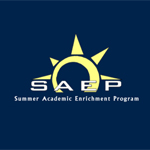 It boasts a 95 percent UCI graduation rate. More than two-thirds of its 350 alumni have graduated from or are currently enrolled in graduate programs, public policy and public health programs, law school and/or teaching credential programs at Stanford, Harvard, UC Berkeley, UCLA, University of Michigan, University of Washington, UC Irvine and other prestigious institutions. Created in 1991, the School of Social Sciences Summer Academic Enrichment Program is an advanced five-week residential research program designed to challenge the most highly motivated social sciences and social ecology undergrads who are strongly committed to pursuing a graduate or professional education. Think you have what it takes? Applications are due February 29. SAEP alumni: We'd love to hear from you! Find this post on our school Facebook page and let us know how SAEP has impacted you.
It boasts a 95 percent UCI graduation rate. More than two-thirds of its 350 alumni have graduated from or are currently enrolled in graduate programs, public policy and public health programs, law school and/or teaching credential programs at Stanford, Harvard, UC Berkeley, UCLA, University of Michigan, University of Washington, UC Irvine and other prestigious institutions. Created in 1991, the School of Social Sciences Summer Academic Enrichment Program is an advanced five-week residential research program designed to challenge the most highly motivated social sciences and social ecology undergrads who are strongly committed to pursuing a graduate or professional education. Think you have what it takes? Applications are due February 29. SAEP alumni: We'd love to hear from you! Find this post on our school Facebook page and let us know how SAEP has impacted you.
Read on...
SPOTLIGHT EVENT Expert Series: Digital Futures - What Comes After the Network Society?
February 16, 7:00 p.m., Social & Behavioral Sciences Gateway, Room 1517
 From the Arab Spring of 2011 to the
development of iPhone apps for the elderly, new communications technologies are radically transforming society, culture and politics. Join the School of Social Sciences for the
second lecture in the school's three-part Expert Speaker Series as anthropologists and industry experts reflect on the changing landscape of the Internet, social media and
virtual worlds for education, culture and industrial design. Speakers include Tom Boellstorff, UCI anthropology professor, Mimi Ito, UCI anthropology and informatics professor
and MacArthur Foundation Chair of Digital Media and Learning, and Maria Bezaitis, Intel Labs Interactions and Experience Research Lab researcher. From the Arab Spring of 2011 to the
development of iPhone apps for the elderly, new communications technologies are radically transforming society, culture and politics. Join the School of Social Sciences for the
second lecture in the school's three-part Expert Speaker Series as anthropologists and industry experts reflect on the changing landscape of the Internet, social media and
virtual worlds for education, culture and industrial design. Speakers include Tom Boellstorff, UCI anthropology professor, Mimi Ito, UCI anthropology and informatics professor
and MacArthur Foundation Chair of Digital Media and Learning, and Maria Bezaitis, Intel Labs Interactions and Experience Research Lab researcher.
Learn more...
SPOTLIGHT EVENT A Conversation with Dennis Hastert, Former Speaker of the House
Public Lecture: February 23, 12:30 p.m., Biological Sciences III, Room 1200
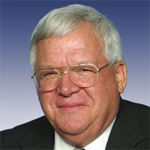 The UCI Center for the Study of
Democracy presents the annual Jack W. Peltason Lecture, "Reflections on Washington Past, Present, and Future," featuring Dennis Hastert, Former Speaker of the United States
House of Representatives (1999 to 2007). As the country's longest-serving Republican Speaker, he helped chart the nation's course through some of its most trying times,
including 9/11 and controversial Medicare reform. The public lecture is free and open to the public. The UCI Center for the Study of
Democracy presents the annual Jack W. Peltason Lecture, "Reflections on Washington Past, Present, and Future," featuring Dennis Hastert, Former Speaker of the United States
House of Representatives (1999 to 2007). As the country's longest-serving Republican Speaker, he helped chart the nation's course through some of its most trying times,
including 9/11 and controversial Medicare reform. The public lecture is free and open to the public.
Learn more...
|
 |


 The roots of the South African Cape vineyards date back to the 1600s. A main stop along the international spice shipping route, the region's climate and varying soil types
proved to be excellent growing conditions for what was then a widely used remedy for scurvy: wine. Despite its rich heritage, it wasn't until the late 1990s that the country's
vintage came to be recognized internationally alongside more established favorites. The now highly regarded and sought after South African brands have industry-wide production
advancements to thank, in part, for their entry into the global market place, but also - and perhaps more importantly, says UCI sociologist Nina Bandelj - the symbolic value
behind the labels. In her new book, The Cultural Wealth of Nations, Bandelj and co-editor Frederick Wherry, University of Michigan, analyze how country-specific symbolism and
reputation - or cultural wealth - are often exploited for economic development purposes. Below, Bandelj explains how the national branding of unique geographical characteristics
and cultural customs - from the blossoming wine industry of South Africa to the rolling, tourist-filled hills of Tuscany - have helped economies around the world prosper, and
what this can teach us about culture's role in the contemporary economy.
The roots of the South African Cape vineyards date back to the 1600s. A main stop along the international spice shipping route, the region's climate and varying soil types
proved to be excellent growing conditions for what was then a widely used remedy for scurvy: wine. Despite its rich heritage, it wasn't until the late 1990s that the country's
vintage came to be recognized internationally alongside more established favorites. The now highly regarded and sought after South African brands have industry-wide production
advancements to thank, in part, for their entry into the global market place, but also - and perhaps more importantly, says UCI sociologist Nina Bandelj - the symbolic value
behind the labels. In her new book, The Cultural Wealth of Nations, Bandelj and co-editor Frederick Wherry, University of Michigan, analyze how country-specific symbolism and
reputation - or cultural wealth - are often exploited for economic development purposes. Below, Bandelj explains how the national branding of unique geographical characteristics
and cultural customs - from the blossoming wine industry of South Africa to the rolling, tourist-filled hills of Tuscany - have helped economies around the world prosper, and
what this can teach us about culture's role in the contemporary economy.  We all have memories of events so important that we can identify exactly where we were when they happened, who was with us, what we wore, or where we sat. I remember the day my
father told me about the Holocaust. We were in the car - a blue Chevrolet with plastic seat covers that cracked in the cold - driving to my weekly piano lesson. I can't recount
exactly what he said, but my memory remains fresh with a sense of horror so overwhelming I could hardly breathe. And then he told me: "You must always remember that there are no
depths to which man cannot sink, but there also are no heights to which we cannot soar." I have often thought about that over the past 20 years, as I have conducted research on
the Holocaust, trying to discover what made people respond so differently to the suffering of others. I realized the themes that emerged during the Holocaust resonate with other
periods of genocide and other instances of ethnic cleansing, other acts of prejudice and discrimination, of group hatred, and animosity, just as they resonate with other
instances of compassion, heroic altruism, and moral courage.
We all have memories of events so important that we can identify exactly where we were when they happened, who was with us, what we wore, or where we sat. I remember the day my
father told me about the Holocaust. We were in the car - a blue Chevrolet with plastic seat covers that cracked in the cold - driving to my weekly piano lesson. I can't recount
exactly what he said, but my memory remains fresh with a sense of horror so overwhelming I could hardly breathe. And then he told me: "You must always remember that there are no
depths to which man cannot sink, but there also are no heights to which we cannot soar." I have often thought about that over the past 20 years, as I have conducted research on
the Holocaust, trying to discover what made people respond so differently to the suffering of others. I realized the themes that emerged during the Holocaust resonate with other
periods of genocide and other instances of ethnic cleansing, other acts of prejudice and discrimination, of group hatred, and animosity, just as they resonate with other
instances of compassion, heroic altruism, and moral courage.
 They call it the "Book of Records" - a well-worn folder filled with old papers that Rameen and Shauhin Talesh have had since childhood. Every time the brothers played
basketball, football, foosball, backgammon, Scrabble or any other game, they would duly note the winner. "We'd write down all of our matches," Rameen says. "I had the advantage
of being older, so I'd usually start out beating him, but there'd always come a time when he'd take over." The Talesh brothers (they have no other siblings) still engage in
friendly sibling rivalry - notably during intramural basketball games at UC Irvine's Anteater Recreation Center - but they no longer keep records of their wins and losses.
They've evened the score. Both graduated from UCI, went on to earn advanced degrees and launch careers, then returned to campus to work for their alma mater - Rameen as
assistant vice chancellor for student affairs and dean of students, and Shauhin as assistant professor of law and criminology, law & society.
They call it the "Book of Records" - a well-worn folder filled with old papers that Rameen and Shauhin Talesh have had since childhood. Every time the brothers played
basketball, football, foosball, backgammon, Scrabble or any other game, they would duly note the winner. "We'd write down all of our matches," Rameen says. "I had the advantage
of being older, so I'd usually start out beating him, but there'd always come a time when he'd take over." The Talesh brothers (they have no other siblings) still engage in
friendly sibling rivalry - notably during intramural basketball games at UC Irvine's Anteater Recreation Center - but they no longer keep records of their wins and losses.
They've evened the score. Both graduated from UCI, went on to earn advanced degrees and launch careers, then returned to campus to work for their alma mater - Rameen as
assistant vice chancellor for student affairs and dean of students, and Shauhin as assistant professor of law and criminology, law & society.
 On January 25, Mohamed El-Erian launched the inaugural lecture of the School of Social Sciences Dean's Distinguished Lecture Series. The CEO and co-CIO of Pacific Investment
Management Co. (PIMCO), a Newport Beach-based investment firm which manages the world's largest bond fund, El-Erian is a frequent commentator on the post-2008 financial crisis,
the sovereign debt and Eurozone crisis, and political upheavals in the Middle East. His lecture offered insight on the roles that politics, policies and markets must play in
turning around the global economy.
On January 25, Mohamed El-Erian launched the inaugural lecture of the School of Social Sciences Dean's Distinguished Lecture Series. The CEO and co-CIO of Pacific Investment
Management Co. (PIMCO), a Newport Beach-based investment firm which manages the world's largest bond fund, El-Erian is a frequent commentator on the post-2008 financial crisis,
the sovereign debt and Eurozone crisis, and political upheavals in the Middle East. His lecture offered insight on the roles that politics, policies and markets must play in
turning around the global economy.
 Jon Sprouse, cognitive sciences assistant professor, has received the Linguistic Society of America's 2011 Best Paper in Language award for "A Test of the Cognitive Assumptions
of Magnitude Estimation: Commutativity Does Not Hold for Acceptability Judgments." The honor recognizes the best paper(s) published in the society's premiere journal, Language,
in any given year. Sprouse's study appeared in the June issue of the quarterly publication and was one of two recognized with the award at the society's annual meeting, held
January 5-8 in Portland. Sprouse has been a faculty member in UCI's cognitive sciences department since 2007. His research focuses on experimental approaches to syntactic theory
and the relationship between syntactic theory and sentence processing. He is the associate director of the School of Social Sciences' new Center for Language Science and a
member of the Linguistic Society of America's Teaching Linguistics editorial board.
Jon Sprouse, cognitive sciences assistant professor, has received the Linguistic Society of America's 2011 Best Paper in Language award for "A Test of the Cognitive Assumptions
of Magnitude Estimation: Commutativity Does Not Hold for Acceptability Judgments." The honor recognizes the best paper(s) published in the society's premiere journal, Language,
in any given year. Sprouse's study appeared in the June issue of the quarterly publication and was one of two recognized with the award at the society's annual meeting, held
January 5-8 in Portland. Sprouse has been a faculty member in UCI's cognitive sciences department since 2007. His research focuses on experimental approaches to syntactic theory
and the relationship between syntactic theory and sentence processing. He is the associate director of the School of Social Sciences' new Center for Language Science and a
member of the Linguistic Society of America's Teaching Linguistics editorial board.  It boasts a 95 percent UCI graduation rate. More than two-thirds of its 350 alumni have graduated from or are currently enrolled in graduate programs, public policy and public health programs, law school and/or teaching credential programs at Stanford, Harvard, UC Berkeley, UCLA, University of Michigan, University of Washington, UC Irvine and other prestigious institutions. Created in 1991, the School of Social Sciences Summer Academic Enrichment Program is an advanced five-week residential research program designed to challenge the most highly motivated social sciences and social ecology undergrads who are strongly committed to pursuing a graduate or professional education. Think you have what it takes? Applications are due February 29. SAEP alumni: We'd love to hear from you! Find this post on our school Facebook page and let us know how SAEP has impacted you.
It boasts a 95 percent UCI graduation rate. More than two-thirds of its 350 alumni have graduated from or are currently enrolled in graduate programs, public policy and public health programs, law school and/or teaching credential programs at Stanford, Harvard, UC Berkeley, UCLA, University of Michigan, University of Washington, UC Irvine and other prestigious institutions. Created in 1991, the School of Social Sciences Summer Academic Enrichment Program is an advanced five-week residential research program designed to challenge the most highly motivated social sciences and social ecology undergrads who are strongly committed to pursuing a graduate or professional education. Think you have what it takes? Applications are due February 29. SAEP alumni: We'd love to hear from you! Find this post on our school Facebook page and let us know how SAEP has impacted you.
 From the Arab Spring of 2011 to the
development of iPhone apps for the elderly, new communications technologies are radically transforming society, culture and politics. Join the School of Social Sciences for the
second lecture in the school's three-part Expert Speaker Series as anthropologists and industry experts reflect on the changing landscape of the Internet, social media and
virtual worlds for education, culture and industrial design. Speakers include Tom Boellstorff, UCI anthropology professor, Mimi Ito, UCI anthropology and informatics professor
and MacArthur Foundation Chair of Digital Media and Learning, and Maria Bezaitis, Intel Labs Interactions and Experience Research Lab researcher.
From the Arab Spring of 2011 to the
development of iPhone apps for the elderly, new communications technologies are radically transforming society, culture and politics. Join the School of Social Sciences for the
second lecture in the school's three-part Expert Speaker Series as anthropologists and industry experts reflect on the changing landscape of the Internet, social media and
virtual worlds for education, culture and industrial design. Speakers include Tom Boellstorff, UCI anthropology professor, Mimi Ito, UCI anthropology and informatics professor
and MacArthur Foundation Chair of Digital Media and Learning, and Maria Bezaitis, Intel Labs Interactions and Experience Research Lab researcher. The UCI Center for the Study of
Democracy presents the annual Jack W. Peltason Lecture, "Reflections on Washington Past, Present, and Future," featuring Dennis Hastert, Former Speaker of the United States
House of Representatives (1999 to 2007). As the country's longest-serving Republican Speaker, he helped chart the nation's course through some of its most trying times,
including 9/11 and controversial Medicare reform. The public lecture is free and open to the public.
The UCI Center for the Study of
Democracy presents the annual Jack W. Peltason Lecture, "Reflections on Washington Past, Present, and Future," featuring Dennis Hastert, Former Speaker of the United States
House of Representatives (1999 to 2007). As the country's longest-serving Republican Speaker, he helped chart the nation's course through some of its most trying times,
including 9/11 and controversial Medicare reform. The public lecture is free and open to the public.